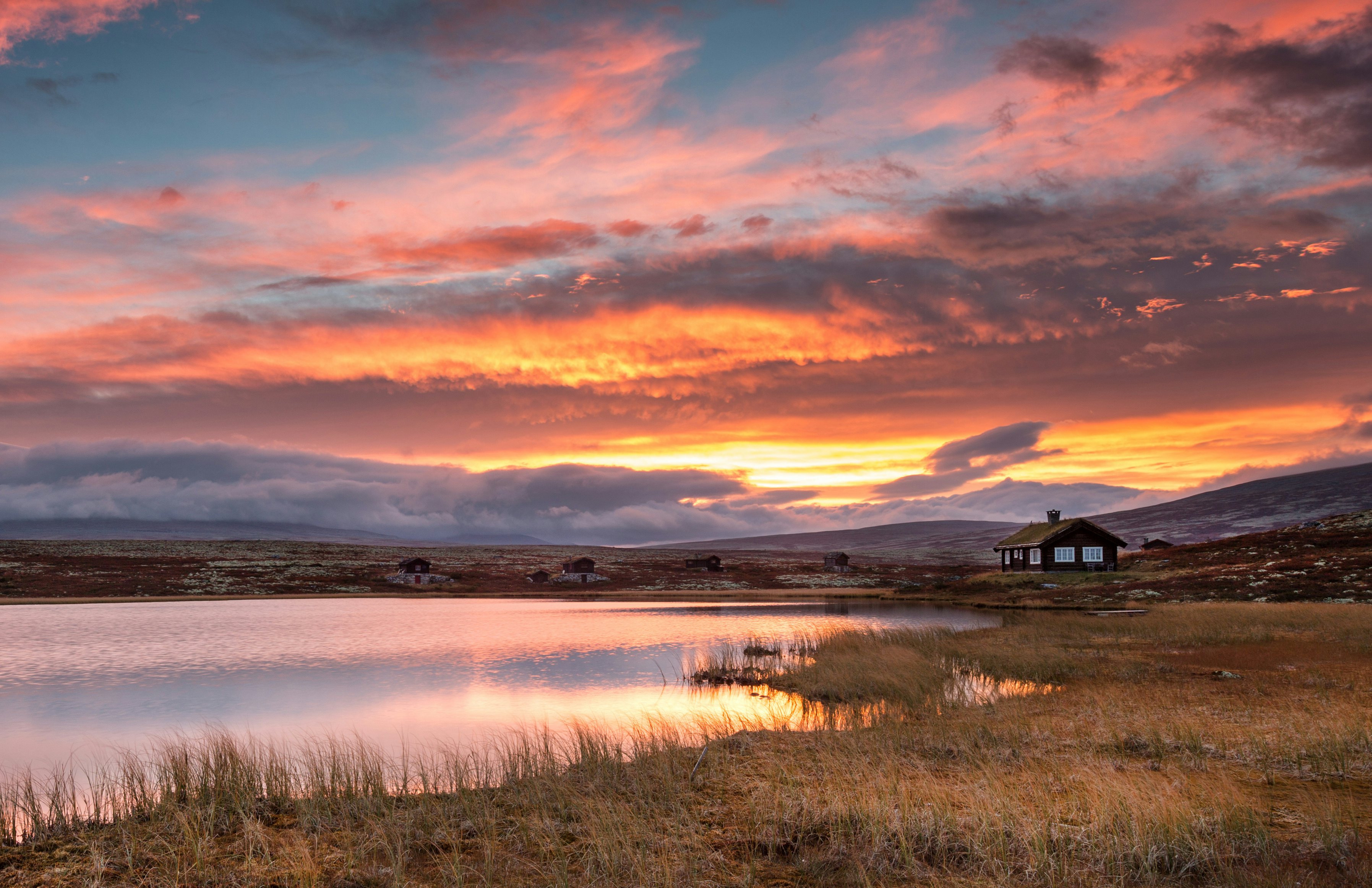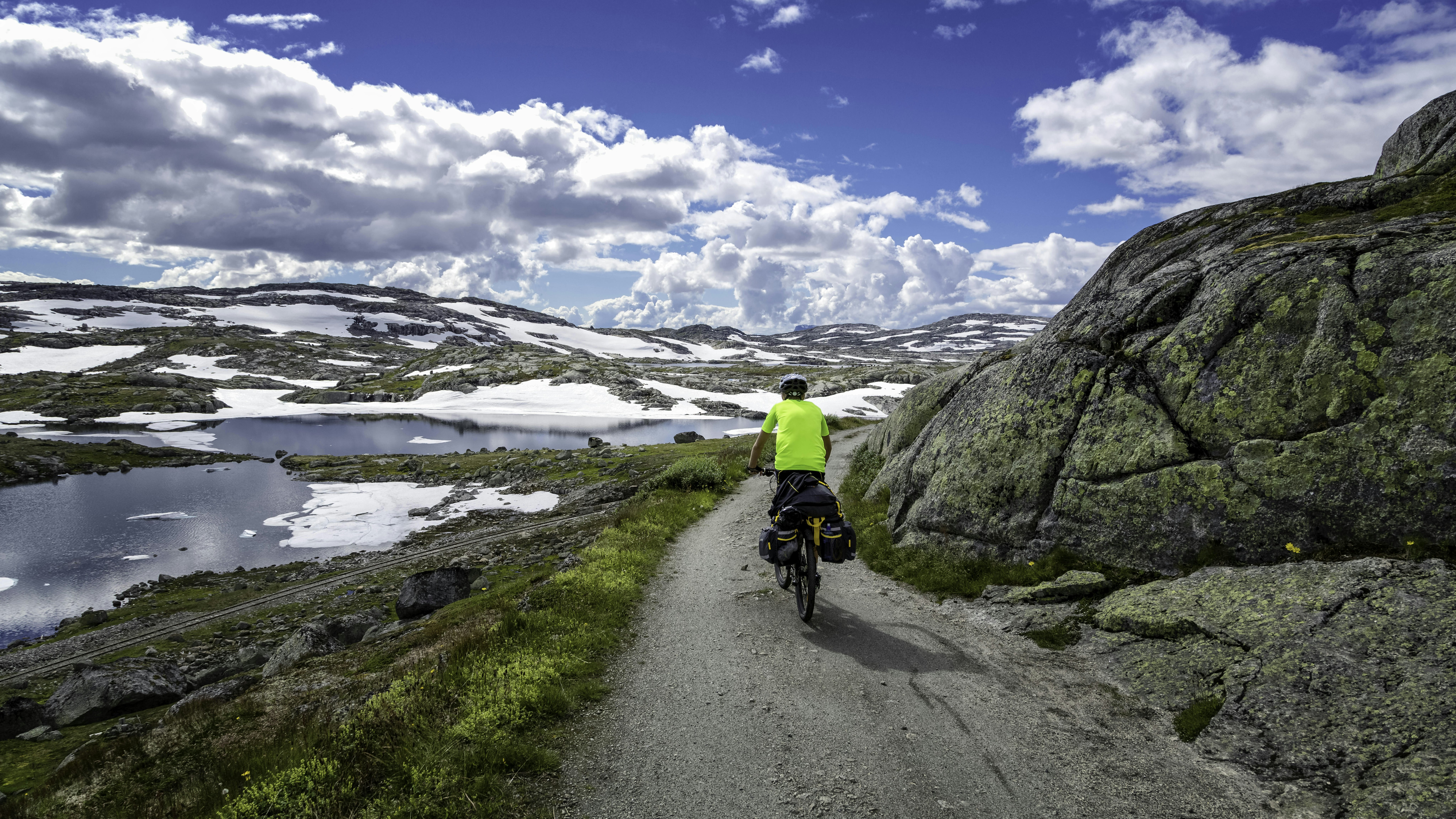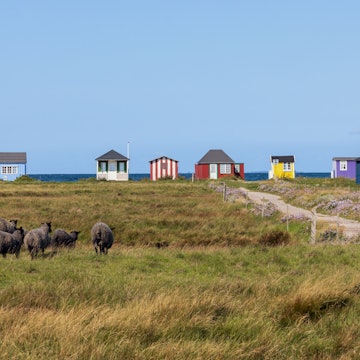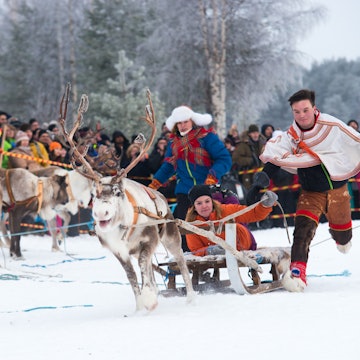
Reindeer, fjords and auroras: the 11 best national parks in Norway

Sep 21, 2021 • 10 min read

Looking into the land of the gods at Jotunheimen © Jonas Tufvesson / Shutterstock
From the south's deeply riven, sapphire-blue fjords to the reindeer-bobbled, glacier-capped wilderness of the Arctic north, nature in Norway is off the scale. Whether you want to strike out on foot into vast forests for the never-ending days of the Midnight Sun, ski lonely heights in the depth of winter, or crest spiky granite mountains that look like the figment of a child’s imagination, Norway delivers.
You can barely touch a map of Norway without dipping into a national park, of which there are (deep breath) a staggering 47. And what national parks! Here's where the national spirit of friluftsliv (a love of outdoor living) really comes into play, and you’ll soon be itching to jump into hiking boots, skis, a bike saddle or kayak and join the locals in their outdoor pursuits.
Ready to dive in at the deep end? Here’s our take on Norway’s 11 best national parks.

Tips for exploring Norway's national parks
When it comes to camping, Norway's national parks are the dream. Wild camping is permitted pretty much everywhere, providing you follow a few common-sense rules (be discreet, carry all your own gear, take out your rubbish and never stay more than two nights in one spot). Just be ready for the climate; sub-zero winter camping is not an activity to be undertaken lightly.
For a touch more comfort, the country's terrific network of hiking and ski-touring trails connects to 550 cabins run by Den Norske Turistforening (DNT), offering overnight shelter, a warm space for your sleeping bag and–in many huts–simple provisions. Some cabins are staffed in summer; in winter, you'll need to get the key and let yourself in. Either way, it's a good idea to book in advance through the DNT website.

Jotunheimen National Park
The name, meaning ‘Home of Giants’, gives the game away at this magnificent national park. Jotunheimen promises great things and, trust us, they are greater than you could ever imagine. In central Southern Norway, this 1151-sq-km national park presents a God-like canvas of glaciers, phenomenally blue lakes, crashing falls and dark fangs of mountains soaring overhead. Amongst them are the country’s two highest peaks: Galdhøpiggen (2469m) and Glittertind (2465m).
Wild country? It sure is, but it’s nevertheless accessible, thanks to 50 marked hiking trails. These trails include some of Norway’s most epic hikes–Besseggen ridge and the ascents of Falketind and Galdhøpiggen among them–commanding out-of-this-world views. Beyond this, you can hook onto via ferrata cables, go river rafting, ride horses through soul-stirring terrain and, in winter, enjoy pristine backcountry skiing.
Spend enough time here and you might get lucky and spot reindeer, elk, mink and wolverines in the park’s quieter, remoter reaches. Wild camping is the way to experience the park at its most peaceful–especially during the peak summer months. In winter, DNT mountain cabins take over.

Stabbursdalen National Park
Fancy going off grid? Stabbursdalen National Park will take you almost off the map. Set pretty much as far north as you can go without dropping into the Barents Sea, this deliciously remote park offers a genuine taste of the Arctic. If you’ve never heard of it, you’re not alone. This is the secret star among Norway’s national parks–a beautifully forgotten place, home to the northernmost pine forest in the world, wild, barren mountains, open plateaux, narrow ravines and glassy rapids, pools and waterfalls bubbling up from the salmon-filled Stabburselva River.
Make it this far and you might not see another soul for days. No proper roads cross the 747-sq-km park and only a handful of trails are waymarked, so a spirit of proper back-to-nature exploration lives on here. Come to camp, escape civilization for a spell and hang out with wildlife, including elk and the elusive wolverine and Eurasian lynx. The visitor centre at Stabbursnes can furnish you with walking maps and trail advice.

Rondane National Park
One of Europe’s last remaining refuges for wild reindeer, Rondane National Park is a terrific place to tiptoe away from the crowds and escape back to nature. Reindeer are joined by a Norwegian ‘big five’ of wildlife: bears, lynx, moose, musk ox and wolves. Opened in 1962, this was Norway’s first national park, and its 963-sq-km of wilderness is capped off by the bare, rugged, stone peaks of the Rondane massif, which in-the-know Norwegians rave about as some of the country’s finest Alpine hiking terrain.
The park’s ethereal blue light, most evident under the snowy blanket of winter, has inspired many artists and writers over the ages, most famously Norwegian playwright Henrik Ibsen, who described these landscapes as 'palace piled upon palace'. White birch at lower elevations rises to plateaux brushed with lichen and heather and glaciated peaks.
Waymarked 'T' trails (marked by the DNT) take hikers deep into the park and link up scattered trekkers' huts. Hikes to remember include the summit trails to 2178m Rondslottet and 2138m Storronden. For something easier, check out the wispy Ulafossen falls, cascading 50m over a cliff face, and Sohlbergplassen, a viewpoint among the pines, with broad views across Atnasjøen Lake.

Saltfjellet-Svartisen National Park
The call of the empty, frozen north makes itself keenly heard in vast, 2102-sq-km Saltfjellet-Svartisen National Park, which bombards visitors with some of the most dramatic landscapes in Norway. This is the best place in the country to go glacier hiking inside the Arctic Circle. Just head west to the 379-sq-km Svartisen ice cap, Norway's second-largest glacier, a staggering sweep of deeply crevassed, surreally blue ice.
Alternatively, go east and you’ll hit lush birch forests and the bleak, high moorlands of the Saltfjellet massif rippling towards the Swedish border. Wolverine, lynx, elk and Arctic foxes all call this home, but they keep themselves hidden. With rapidly changing weather, long distances and much of the park off the radar (a phone signal is not a given), this is one for experienced hikers and those willing to camp or stay the night in rustic hikers' cabins.

Femundsmarka National Park
Other parks get more fuss, but 573-sq-km Femundsmarka, snuggled deep among the lakes, tundra, marshes and forests on the border to Sweden, is a quiet, unspoilt, little-explored wilderness. It's perfect for days of exhilarating paddling on calm waterways or soul-searching hikes far away from the tourist throngs, with accommodation in open huts with nothing but a bunk and wood-burning stove or at more comfy DNT cabins dotted around the park.
Femundsmarka is a tremendously wild mix of barren mountains, enchanting, lichen-draped, old-growth silver pine forests and placid lakes. You can walk, canoe and fish for days without being disturbed. Keep an eye peeled for reindeer, moose, otters, and rare brown bears, lynx and wolves, as well as birdlife like ospreys and cackling ptarmigans. There’s also a small population of musk oxen around the Røa and Mugga Rivers in summer (drifters from nearby Dovrefjell).

Dovrefjell-Sunndalsfjella National Park
Bleakly beautiful, wildly mountainous and blanketed in snow for much of the year, Dovrefjell-Sunndalsfjella is a vast, unrelentingly epic, 1830-sq-km national park bang in Norway’s heart–so enormous that it's the favored escape of Norway's most famous herd of musk oxen. Named after the musky odor they emit during rutting season, these shaggy-haired, curve-horned giants are masters of camouflage, so join a summer safari (May to September) in Oppdal and let the pros show you their hiding places.
Dovrefjell-Sunndalsfjella's staggering Alpine landscapes also attract wild reindeer, wolverines, Arctic foxes and golden eagles. Mountains and trails abound, but the highest of the high is fin-shaped, 2286m Snøhetta, a beacon to hikers, with far-reaching views across the Dovrefjell range. Guided hikes are available if you don’t fancy going it alone.

Lofotodden National Park
The Lofoten Islands flick out from mainland Norway like a dragon’s tail, and at their southernmost tip is the jewel-in-the-crown island of Moskenesøya, awarded national park status in 2019. Looking at this fantasy spread of dark, gnarly granite mountains, great arcs of pale sand and brightly painted fishing villages that no Instagram pic can fully capture, the only question is why it took so long.
This is the Arctic island dream, whether viewed in the golden light of the Midnight Sun or under a rave of Northern Lights in winter. Hiking is a major draw, but you can also just kick back on an insanely lovely, mountain-backdropped beach. Try the isolated north coast retreats of Bunes and Kvalvika, reached respectively by ferry and on foot, and camp overnight for a beyond-the-crowds taste of splendid isolation.
For more of a challenge, trek up 1029m Hermannsdalstinden. The peak might not sound all that high but it sure feels it, as the trail climbs abruptly above a spine of jagged peaks and inky waters.

Hardangervidda National Park
This is the big one. Spread across 3422 sq km in south-central Norway, Hardangervidda is the country’s largest national park. It's an Alpine feast of all the things that make Norway so alluring: wild plateaux, deeply-carved valleys, glacier-frosted mountains, crash-bang waterfalls and lakes in every fathomable shade of blue. All of this is infinitely appealing to wildlife–elk, musk ox, Arctic fox and Europe’s largest herd of wild reindeer (7000 plus at the last count).
Because of the harsh climate and heavy snowfall, hiking here is restricted to the summer months (July and August are best), with top billing going to the steep, two-day trek from Finse to Vøringfoss falls, which nosedives 145m over cliffs in a single drop. Fishing in the lakes and rivers and foraging for berries are other warm-weather activities; in winter this is as fine a place as any in Europe for cross-country and ski touring.
How wild is it? Let’s just say that exploring the remotest reaches of the park has been likened to a polar expedition… If you want something tamer, Rte 7 is a highly scenic road trip cutting through stunning landscapes in the north of the park. For the inside scoop on everything Hardangervidda has to offer, stop by Hardangervidda Natursenter in Øvre Eidfjord.

Jostedalsbreen National Park
One word: glaciers. While Jostedalsbreen National Park in the Western Fjords is no one-hit wonder, getting a good glimpse of 60km-long Jostedalsbreen–the largest ice cap in mainland Europe–is the top of many people's wish lists. We wouldn’t blame you for focusing on the glacier: this phenomenal sweep of eternal ice floors with its beauty (and even more so than if you have the stamina and skill to hike on it). The glacier separates two of the world’s longest fjords, the Sognefjord and the Nordfjord, and their shapely peaks and ice-blue waters.
Most visitors head straight for big-hitters like Briksdalsbreen, an arm of the great glacier, best appreciated on an uplifting 5km hike through the valley. But you would be wise to cast a wider net, visiting lesser-known wonders like Kjenndalsbreen, another offshoot of the glacier, for fewer crowds and the chance to kayak, boat, canoe and picnic at the peak-clasped, brilliantly turquoise lake of Lovatnet.

Sør-Spitsbergen National Park, Svalbard
Home to more polar bears than people, the Svalbard archipelago is the final frontier before the North Pole–a place of brutal beauty, bare, muscular mountains and, in winter, bone-chilling cold. The pastel light and pure air are the kind you only find this far north of the Arctic Circle. In summer, you can hike, and in winter you can take guided snowmobile and dog-sled expeditions into the wilds, with some great eco-friendly options run by Basecamp Explorer. On an expedition cruise, you can only really touch the fringes.
In the south of the island of Spitsbergen, this national park is a frozen wilderness. The area has a bird reserve protecting species like barnacle geese, common eiders and black-legged kittiwakes, and with any luck, you’ll also spot wildlife like reindeer, Arctic foxes, walrus, whales and, the clincher, polar bears. The national park is 65% ice cap and the rest tundra–equally beautiful in the Midnight Sun and Polar Night, when the Northern Lights regularly fill the skies.

Folgefonna National Park
Hugging the southern shore of Hardanger Fjord, Folgefonna National Park steals the show when it comes to glacier hiking and summer skiing, thanks to its icing-on-the-cake Folgefonn icecap (Norway’s third largest). It’s a nature-gone-wild spectacle of lofty mountains, churning falls, wild valleys, glacier tongues, fast-flowing rivers, jade-green lakes and wildflower-freckled pastures.
The park hits the Alpine bull’s-eye perfectly, but its harsh climate makes it best explored from May to September. Come then and you’re in for a treat. Most action revolves around the glacier, which you can hike, kayak or cross-country ski across with a guide. Walking trails thread through the park, too, linked up by four self-service cabins. The classic is the fjord-to-fjord, a two-day historic hiking trail across Folgefonna glacier from Sundal to Odda.
You may also like:
13 best places to visit in Norway
The best time to go to Norway
Oslo to Bergen: Europe’s best train journey?















